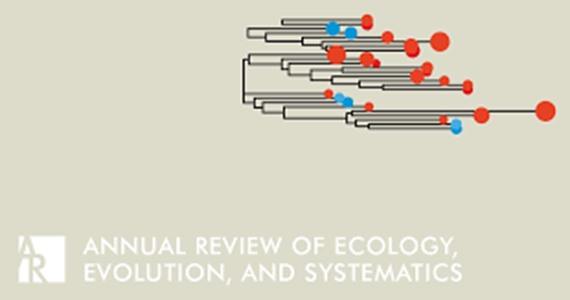生命的起源指南
IF 11.2
1区 生物学
Q1 ECOLOGY
Annual Review of Ecology, Evolution, and Systematics
Pub Date : 2023-08-22
DOI:10.1146/annurev-ecolsys-110421-101509
引用次数: 1
摘要
生命的起源需要一个连续体,从简单的益生元化学到具有基因和分子机器的细胞。以生命为向导,我们考虑在基因出现之前,选择如何促进复杂性的增加。结构化的、远离平衡的环境,如热液系统,驱动CO2和H2之间的反应,形成自组织成原始细胞的有机物。原始细胞内的二氧化碳固定产生了一个反应网络,其拓扑结构预示着新陈代谢的普遍核心。正反馈循环通过这个网络放大通量,产生促进生长的代谢遗传。遗传密码的模式表明,基因和蛋白质是通过氨基酸和核苷酸在这个原代谢网络中的直接生物物理相互作用产生的。随机基因序列模板非随机肽,在生长的原始细胞中产生可选择的功能。这种依赖于上下文的信息的出现无缝地产生了自养的最后一个普遍共同祖先。预计《生态、进化和分类学年度评论》第54卷的最终在线出版日期是2023年11月。修订后的估计数请参阅http://www.annualreviews.org/page/journal/pubdates。本文章由计算机程序翻译,如有差异,请以英文原文为准。
Life as a Guide to its Own Origins
The origin of life entails a continuum from simple prebiotic chemistry to cells with genes and molecular machines. Using life as a guide to this continuum, we consider how selection could promote increased complexity before the emergence of genes. Structured, far-from-equilibrium environments such as hydrothermal systems drive the reaction between CO2 and H2 to form organics that self-organize into protocells. CO2 fixation within protocells generates a reaction network with a topology that prefigures the universal core of metabolism. Positive feedback loops amplify flux through this network, giving a metabolic heredity that promotes growth. Patterns in the genetic code show that genes and proteins arose through direct biophysical interactions between amino acids and nucleotides in this protometabolic network. Random genetic sequences template nonrandom peptides, producing selectable function in growing protocells. This context-dependent emergence of information gives rise seamlessly to an autotrophic last universal common ancestor. Expected final online publication date for the Annual Review of Ecology, Evolution, and Systematics, Volume 54 is November 2023. Please see http://www.annualreviews.org/page/journal/pubdates for revised estimates.
求助全文
通过发布文献求助,成功后即可免费获取论文全文。
去求助
来源期刊
CiteScore
19.90
自引率
1.70%
发文量
21
期刊介绍:
The Annual Review of Ecology, Evolution, and Systematics is a scholarly publication that has been in circulation since 1970. It focuses on important advancements in the areas of ecology, evolutionary biology, and systematics, with relevance to all forms of life on Earth. The journal features essay reviews that encompass various topics such as phylogeny, speciation, molecular evolution, behavior, evolutionary physiology, population dynamics, ecosystem processes, and applications in invasion biology, conservation, and environmental management. Recently, the current volume of the journal transitioned from a subscription-based model to open access through the Annual Reviews' Subscribe to Open program. Consequently, all articles published in the current volume are now available under a CC BY license.

 求助内容:
求助内容: 应助结果提醒方式:
应助结果提醒方式:


